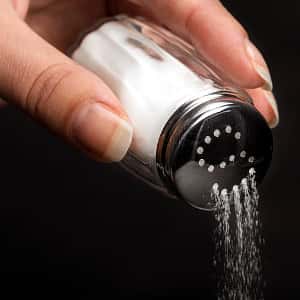
Iodine is essential for thyroid function, which is why many countries add iodine to their salt. Much, but not all, of the salt sold in the supermarket for home use is iodized. But what about the salt used by the big food manufacturers? Do they also use iodized salt?
Do Processed Foods Contain Iodized Salt?
Q. Is there iodine in the salt used in processed foods like cereal, bread, and frozen products such as pizza and some vegetables? I am concerned about the impact on thyroid health.
A. According to the National Institutes of Health Office of Dietary Supplements, processed foods almost never contain iodized salt. Dairy products such as milk, cheese or yogurt are good sources of iodine, however (Nutrients, May 26, 2018). If you are not using iodized salt at your table, you might want to check that your multivitamin contains iodine.
Is Iodized Salt Safe?
In China, some consumers were concerned that iodized salt would increase their risk of thyroid disorders. An epidemiological investigation found, however, that adults who ate less salt and those who ate noniodized salt were at higher risk of thyroid nodules (American Journal of Clinical Nutrition, Sept., 2013). This risk was increased even further among people who did not drink milk. The researchers conclude that the Universal Salt Iodization program should benefit a large proportion of the Chinese population.
Iodized Salt Use in the US:
In the US, doctors generally assume that the use of iodized salt and multivitamins means that iodine deficiency is rare. That assumption may not be safe, since the median urinary iodine concentration among pregnant women in the National Health and Nutrition Examination Survey (NHANES) from 1999 to 2006 was 148 micrograms/liter (Journal of Nutrition, June, 2013). That means, while half of pregnant women in this country have adequate iodine, above the 150 micrograms/liter established by the WHO, the other half are falling below.
An analysis of more recent data from NHANES, from 2011 to 2014 found that mean iodine intake among women of reproductive age in the US was 110 micrograms/liter, under the level considered adequate. The investigators conclude that some groups are at risk of mild iodine deficiency (Nutrients, July 6, 2018).
Citations
- Chen Z et al, "Associations of noniodized salt and thyroid nodule among the Chinese population: a large cross-sectional study." American Journal of Clinical Nutrition, Sept., 2013. https://doi.org/10.3945/ajcn.112.054353
- Gahche JJ et al, "The prevalence of using iodine-containing supplements is low among reproductive-age women, NHANES 1999-2006." Journal of Nutrition, JUne 2013. DOI: 10.3945/jn.112.169326
- Herrick KA et al, "Iodine status and consumption of key iodine sources in the U.S. population with special attention to reproductive age women." Nutrients, July 6, 2018. DOI: 10.3390/nu10070874
- Lee KW et al, "Food group intakes as determinants of iodine status among US adult population." Nutrients, May 26, 2016. PMID: 27240399 PMCID: PMC4924166

